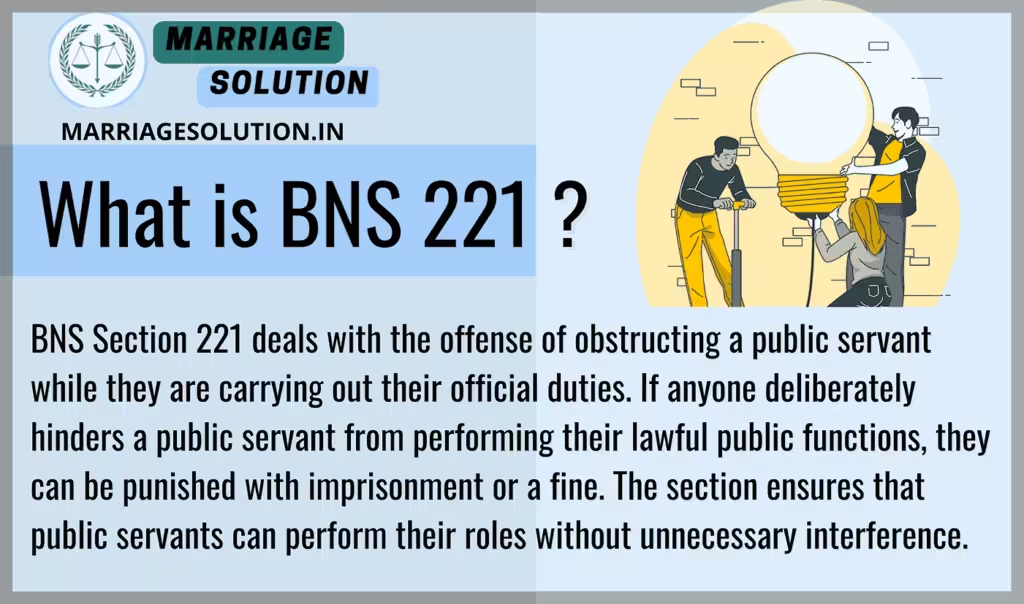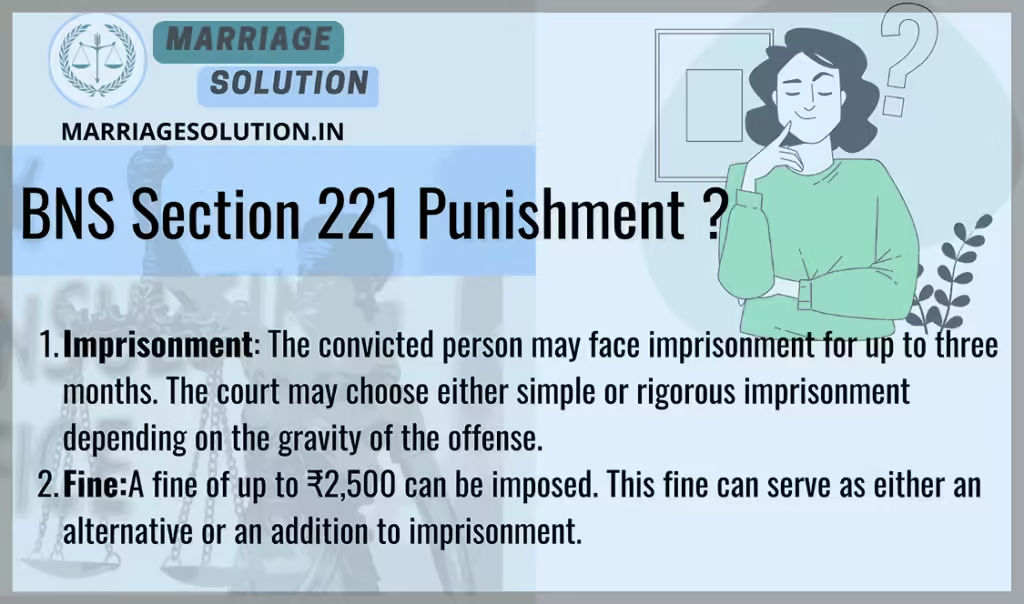Introduction of Section 221 BNS
Section 221 of the Bharatiya Nyaya Sanhita (BNS) focuses on protecting public servants while they perform their official duties. It punishes anyone who intentionally prevents or disturbs a public servant from carrying out lawful work. This ensures smooth functioning of government activities and prevents delays in justice or administration.
The Bharatiya Nyaya Sanhita (BNS) Section 221 replaces the old Indian Penal Code (IPC) Section 186.
What is BNS Section 221 ?
BNS Section 221 deals with the offense of obstructing a public servant while they are carrying out their official duties. If anyone deliberately hinders a public servant from performing their lawful public functions, they can be punished with imprisonment or a fine. The section ensures that public servants can perform their roles without unnecessary interference.

Under Section 221 of the bns act 2023
“Whoever voluntarily obstructs any public servant in the discharge of his public functions, shall be punished with imprisonment which may extend to three months, or with fine which may extend to two thousand five hundred rupees, or with both.”
1. Meaning of “Obstructing a Public Servant”
- A public servant is any government official such as a police officer, magistrate, tax officer, municipal officer, election officer, etc.
- To obstruct means to stop, delay, block, or interfere with the official duties of such a public servant.
- The obstruction must be intentional. If it happens by accident or mistake, it is not an offence.
2. Who is Covered?
This section applies to anyone who:
- Deliberately stops a government officer from doing their lawful duty.
- Creates hurdles so that a public servant cannot complete his task.
- Prevents lawful work like seizure of goods, issuing notices, inspections, or conducting official inquiries.
3. Nature of the Offence
- Non-cognizable → Police cannot arrest without a warrant.
- Bailable → The accused has the right to get bail.
- Non-compoundable → Cannot be settled privately; must go through court.
- Triable by Any Magistrate → Any Magistrate has the authority to hear such cases.
4. Examples of BNS Section 221
- Example 1 – Blocking Inspection:
A tax officer comes to check a shop for tax evasion. The shop owner closes the shutters and refuses to let the officer in. This is obstruction under Section 221. - Example 2 – Stopping Election Duty:
During elections, an officer comes to distribute voter slips. A group of people block his vehicle to stop him from completing the duty. They are guilty under Section 221. - Example 3 – Not Guilty Case:
If a person accidentally blocks a police officer in traffic without knowing, it is not considered an intentional obstruction.
5. Punishment under BNS Section 221
- Imprisonment → Up to 3 months.
- Fine → Up to ₹2,500.
- Both → Court may impose both imprisonment and fine in serious cases.
6. Importance of Section 221
- Protects lawful duties of public servants.
- Ensures smooth governance without interference.
- Discourages people from delaying or blocking official work.
- Promotes respect for government officers while performing legal responsibilities.
Section 221 BNS Overview
BNS Section 221 states that if anyone voluntarily prevents a public servant from discharging their lawful duties, they can be punished. The punishment includes imprisonment for up to three months, a fine up to ₹2,500, or both. The section ensures that public servants can carry out their duties smoothly without any obstruction from individuals.
BNS Section 221: 10 Key Points Explained in Detail
- Voluntary Obstruction:
- The section applies when someone voluntarily or deliberately obstructs a public servant. This means that the act of obstruction is done with intention, not accidentally or without knowledge.
- Public Servant’s Function:
- The obstruction must happen while the public servant is discharging his or her public duties. These duties could include actions like enforcing laws, collecting taxes, serving notices, or any other official task.
- Scope of the Section:
- The scope covers any public servant in any public function. This means that all categories of government officials—whether police officers, municipal workers, or tax officials—are protected under this law.
- Punishment for Obstruction:
- If a person is found guilty of obstructing a public servant, they can face imprisonment for up to three months. This imprisonment can be of either description, which includes simple or rigorous imprisonment.
- Fine for Obstruction:
- The punishment can also include a fine of up to ₹2,500. This fine is a monetary penalty for the offense and can be imposed either in place of or alongside imprisonment, depending on the circumstances.
- Combination of Punishment:
- The court has the discretion to impose both imprisonment and a fine. The severity of the punishment depends on how serious the obstruction was and the nature of the public function that was disrupted.
- Non-Cognizable Offense:
- This offense is non-cognizable, meaning that the police cannot arrest the accused without a warrant. They must seek permission from a magistrate before taking action.
- Bailable Offense:
- The offense is bailable, allowing the accused to apply for bail. The accused can be released from custody while awaiting trial.
- Non-Compoundable:
- The offense is non-compoundable, meaning it cannot be settled between the accused and the public servant. Once a case is filed, it must go through legal proceedings and cannot be resolved outside of court.
- Tried by a Magistrate:
- The offense under this section is triable by any Magistrate. This means that the case can be heard by any magistrate in a lower court, making the legal process more accessible.
Two Examples of BNS Section 221:
- Example 1:
A government official is inspecting illegal construction in a building. One of the building owners, trying to hide the illegal work, locks the gates, preventing the official from entering the premises. By doing this, the owner is obstructing the public servant in the performance of their duties, which is punishable under BNS Section 221. - Example 2:
During an election, a government officer is distributing voter ID cards. A group of people, dissatisfied with the officer’s work, block the officer’s vehicle, stopping them from reaching the distribution center. This intentional obstruction of a public servant’s duties falls under BNS Section 221, and the group can be punished.
BNS 221 Punishment
- Imprisonment:
- The convicted person may face imprisonment for up to three months. The court may choose either simple or rigorous imprisonment depending on the gravity of the offense.
- Fine:
- A fine of up to ₹2,500 can be imposed. This fine can serve as either an alternative or an addition to imprisonment.

BNS 221 bailable or not ?
Bailable: Offenses under this section are bailable, which means the accused has the right to seek bail and be released from custody while the trial is ongoing.
Comparison Table – BNS Section 221 vs IPC Section 186
| Section | What it Means | Punishment | Bail | Cognizable? | Trial By |
|---|---|---|---|---|---|
| BNS Section 221 | Focuses on protecting public servants from intentional obstruction while performing their lawful duties. Anyone who voluntarily prevents or disturbs a public servant during their official functions can be punished. | Imprisonment up to 3 months, or fine up to ₹2,500, or both. | Bailable | Non-Cognizable | Any Magistrate |
| IPC Section 186 (Old) | Penalized anyone who voluntarily obstructed a public servant in the discharge of public functions. Aimed to ensure that government officers could perform duties without interference or resistance. | Imprisonment up to 3 months, or fine up to ₹500, or both. | Bailable | Non-Cognizable | Any Magistrate |
| Key Difference: BNS Section 221 retains the same core meaning as IPC 186 but increases the fine limit from ₹500 to ₹2,500, strengthening protection for public servants and deterring interference in lawful duties. | |||||
BNS Section 221 FAQs
What is BNS Section 221 about?
BNS Section 221 addresses the offense of obstructing a public servant while they are carrying out their public duties. This can involve actions that prevent a government official from performing their job.
What is the punishment for obstructing a public servant?
The punishment can be up to three months of imprisonment, or a fine of up to ₹2,500, or both, depending on the seriousness of the offense.
Is Section 221 a bailable offense?
Yes, the offense under Section 221 is bailable, meaning the accused can apply for bail and may be released from custody while awaiting trial.
What does “non-cognizable” mean in Section 221?
Non-cognizable means that the police cannot arrest the accused without a warrant and must obtain permission from a magistrate to take action against the accused.
Can someone be both fined and imprisoned under Section 221?
Yes, depending on the case, the court may impose both imprisonment and a fine if the offense warrants such a punishment.
Who tries cases under Section 221?
Cases under BNS Section 221 can be tried by any Magistrate, meaning it will be handled in lower courts.
Conclusion
BNS Section 221 plays an important role in protecting the smooth functioning of public duties. It ensures that government officers, inspectors, or other officials can perform their responsibilities without interference. Compared to IPC 186, the fine amount under BNS has been updated to reflect modern times. This section is crucial in upholding respect for lawful authority and maintaining public order.
Need Legal Support?
If you are dealing with court cases, marriage problems, or any other legal issue, our team at Marriage Solution – Lawyer Help is here for you. Simply fill out our quick online enquiry form, and we’ll connect you with the right legal expert to support your needs.
Finished with BNS 221 ? Continue exploring the next provisions of the Bharatiya Nyaya Sanhita (BNS), 2023. Each section includes explanations, examples, and plain-language breakdowns for easy understanding.
- BNS 222 : Omission to assist public servant when bound by law to give assistance.
- https://marriagesolution.in/bns_section/bns-222/
- 223 BNS : Disobedience to order duly promulgated by public servant.
- https://marriagesolution.in/bns_section/223-bns/
- BNS 224 : Threat of injury to public servant.
- https://marriagesolution.in/bns_section/bns-224/
- BNS 225 :Threatening someone with harm so that they do not ask a public servant for help or protection.
- https://marriagesolution.in/bns_section/bns-225/
- BNS 226 : Trying to commit suicide with the intention of forcing or stopping a public servant from using their legal powers.
- https://marriagesolution.in/bns_section/bns-226/
Full IPC Section List: https://marriagesolution.in/ipc-section-list
All Indian Law & Blogs: https://marriagesolution.in/indian-law/
Full BNSS Section List: https://marriagesolution.in/bnss_section-list
